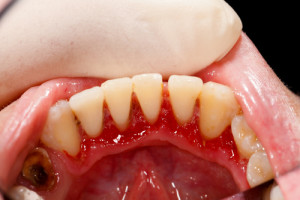Wisdom Teeth – Complications
Many patients wonder if it is always necessary to remove all wisdom teeth. The answer is no, it is not always necessary. However, it is often in the patient’s best interest because these third molars are prone to a number of complications. Some are debated and some are more valid, but the truth is, your dentist will know the best way to help you prevent more serious dental problems from developing. If you have any concerns about wisdom teeth or extraction you should consult with your oral care provider. Here are a few complications he or she might bring to your attention.
Pain

This is the most common reason why patients consult with their dentist about wisdom teeth. There are three main causes of pain associated with wisdom teeth. First, pain from the eruption process. Second, pressure on adjacent nerves. Third, pain from infection, damage to the soft tissue around the tooth, decay, gum disease or infection.
Infection

Pericoronitis is a bacterial infection of the soft tissue around the crown of a partially erupted tooth. Normally the crown of a tooth is positioned above the gum line, but with impacted teeth, the crown only partly breaks through the soft tissue. This is a problem mainly because during development, the crown of a tooth forms within a follicular sac. Once a tooth breaks through the gums that sac is compromised. In fully developed teeth, the entire crown is exposed and the sac deteriorates. However, with only partial eruption, part of the sac remains intact and floods with bacteria. Unfortunately, there is no way for patients to clean the follicular sac and the bacteria cause infection time and time again. In the most extreme cases, this infection can lead to extensive swelling that might impede breathing and result in a potentially life-threatening situation.
Decay
All teeth are susceptible to tooth decay, but the position of wisdom teeth often make them or neighboring teeth, more difficult to clean. These teeth then collect plaque, bacteria and food particles for extended periods of time. If you keep a wisdom tooth and it gets decayed, it is possible for a dentist to place a filling as long as the cavity is small and found on a readily accessible part of the tooth. However, the restoration may not be possible and the long-term outlook of the tooth could be poor. In these cases, once a cavity has formed, the dentist is likely to simply extract the decayed wisdom tooth.
Periodontal (Gum) Disease
In the same line as decay and infection, because wisdom teeth are difficult to clean and often do not fully grow in, bacteria often colonize in the space between the tooth and gum. However, gum disease is not an isolated problem, and if damage occurs in one area, it is likely to spread to neighboring teeth. From there, it can start to deteriorate the soft tissue and connective tissues. Eventually, teeth can loosen and fall out. So though most people would not miss a third molar, they would certainly notice a difference if a second molar went missing. There are some non-extraction approaches the dentist can use to treat gum disease, but it would require more frequent dental cleanings and perhaps gum surgery.
Cysts and Tumors
Though not especially common, tumors and cysts can develop in tissues around impacted wisdom teeth. Usually, the dentist can see pathology in early stages with X-rays. As the cysts or tumors grow, they can damage surrounding bone or adjacent teeth. In these cases, the dentist removes the impacted tooth and refers the patient is to a pathologist for evolution.
Root Resorption of Neighboring Teeth
If an impacted wisdom tooth develops horizontally, it can come in contact with the roots of the neighboring second molar. In these cases, a wisdom tooth acts much like adult teeth do on baby teeth. As the permanent tooth under the primary tooth grows, the roots of the baby tooth dissolve. In the same way, if a wisdom tooth comes in contact with a neighboring molar it can cause resorption. In the worse scenario, the dentist will need to remove both the impacted wisdom tooth and the second molar.
A good dentist would never perform a surgery unless he or she had reason to believe it justified. Listed above are just a few of the complications that can arise with impacted wisdom teeth, and are leading contributors to why extraction is still a standard practice in the United States. The dentist will look for partially erupted teeth, full bony impactions and try to predict the pattern your wisdom teeth will follow. Then, based on his or her assessment, the ultimate decision to have wisdom teeth removed is up to you.
Do not simply guess at whether or not your wisdom teeth need to be removed. Please call us at (801) 406-8670 or (214) 317-4039 to speak with an expert at one of our convenient Salt Lake City, UT or Dallas, TX locations.
 UTAH - 801.406.8670
UTAH - 801.406.8670











